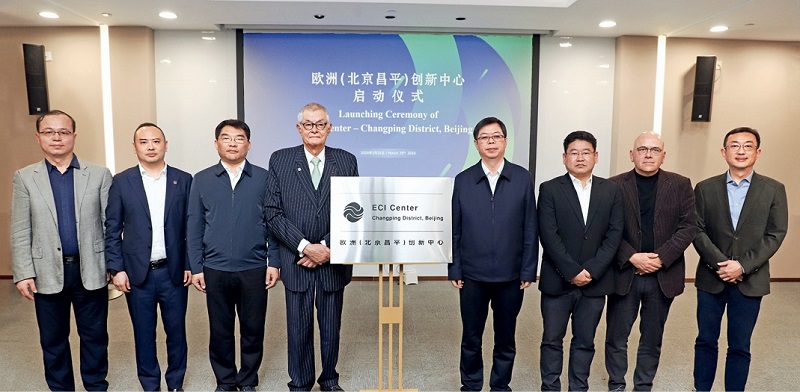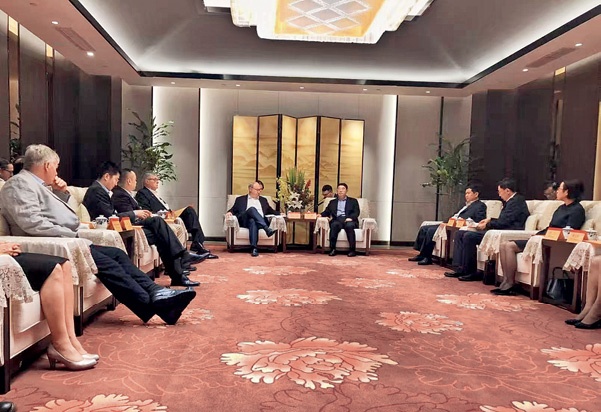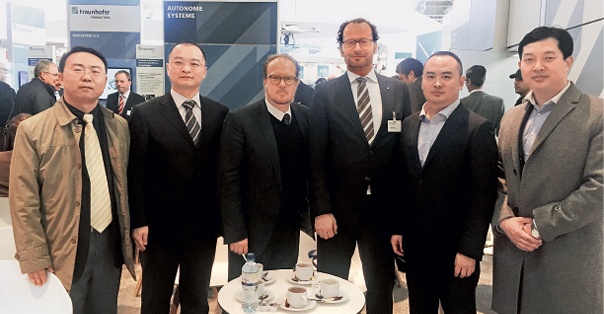Bridging continents through innovation, the EU-China Joint Innovation Center empowers SMEs and launches collaborative hubs to transform geopolitical challenges into shared victories in green tech, AI, and trade.

The Europe (Beijing Changping) Innovation Center is inaugurated in March 2024 in Beijing’s Changping District. Among those pictured are Patrick Nijs (fourth from left), co-founder of the EU-China Joint Innovation Center (EUCJIC); Zhi Xianwei (fourth from right), then head of Changping District; and Zhou Ruixue (second from left), director of the EUCJIC.
“An increasing number of Europeans recognize that Europe cannot decouple from China and must instead strengthen cooperation, especially in technology and trade,” said Zhou Ruixue, director of the EU-China Joint Innovation Center (EUCJIC), in an interview with China Today. Amid geopolitical tensions and economic headwinds, Zhou’s optimism for China-EU collaboration remains unshaken, rooted in his decade-long engagement with European industries. “China’s market scale, developmental momentum, and technological leaps are reshaping European perspectives. The question is no longer whether to collaborate, but how,” he asserted.
As unilateralism and protectionism impact global dynamics, China-EU cooperation has evolved into a linchpin for multilateralism and a catalyst for open economies. Since its inception in 2017, EUCJIC has championed this vision through its mantra, “benefit from technology, share innovation,” bridging gaps between the two sides in tech, trade, and culture. By incubating resource-sharing platforms, spearheading joint R&D ventures, and demystifying market entry for small and medium-sized enterprises (SMEs), the center has transformed abstract collaboration into tangible outcomes.

Derek Vaughan, co-founder of the EUCJIC, leads a delegation of 30 European medical companies on an investigative tour of the Boao Lecheng International Medical Tourism Pilot Zone, where he meets with Wang Lu, then vice governor of Hainan Province.
Breaking Barriers, Building Synergy
The EUCJIC’s genesis dates back to 2014, when former Belgian Ambassador to China Patrick Nijs, after concluding his diplomatic tenure in Beijing, connected with Zhou through a shared commitment to advancing EU-China collaboration. Their aligned vision swiftly evolved into a close partnership, prompting them to spearhead several joint innovation and technology initiatives between Europe and China. Initially, these efforts operated on a project-by-project basis, lacking a formal institutional structure – a gap that persisted until 2016.
That pivotal year, during a visit to Brussels, Zhou met with Gai Lin, secretary general of the European Parliament’s EU-China Friendship Group, alongside members of the European Parliament (MEPs) Nirj Deva and Derek Vaughan. Reflecting on that encounter, Zhou noted, “At the time, the European Parliament housed the EU-China Friendship Group, chaired by Deva. The group maintained a decidedly positive outlook toward China, acknowledging its rising global influence and rapidly expanding economy. Many members were keen to deepen engagement, yet direct channels for sustained dialogue with Chinese counterparts were scarce.”
This meeting proved instrumental in transforming earlier ad hoc collaborations into a structured endeavor, paving the way for the establishment of the EUCJIC, designed as a durable platform to enhance dialogues and cooperation between Europe and China.
“At the time, many in Europe were eager to engage with China, recognizing its vast 1.4-billion-consumer market as a gateway to growth. Meanwhile, China needed Europe’s innovation resources and investments. We quickly aligned and established this institution,” Zhou said. Innovation was chosen as the central theme because of its pivotal role in national development, particularly as China transitioned to an innovation-driven economy. “Europe’s strengths in technology and innovation – evident in countries like Germany and Finland – inspired us to build a bridge for collaboration in innovation, enabling rapid exchanges of resources and expertise,” he added. The center soon emerged as a conduit for cross-continental ideation.
By 2017, despite a “golden era” of political rapport and deepening economic engagement between China and the EU, operational bottlenecks persisted. European firms grappled with unfamiliar regulations and the business environment in China, while Chinese enterprises sought cutting-edge European tech. Practical channels for cooperation, however, remained limited. “We became the missing link,” Zhou explained. EUCJIC’s non-governmental organization agility allowed it to bypass bureaucracy, fostering partnerships that married Europe’s SME-driven innovation with China’s market heft. “Europe needed China’s scale; China needed Europe’s ingenuity. It’s symbiosis,” Zhou remarked.
Empowering Europe’s SMEs in China
SMEs, the unsung heroes of Europe’s economy, generating 100 million jobs and over 50 percent of EU GDP, when entering China, can be deterred by financing hurdles, cultural mismatches, and regulatory labyrinths. “For European SMEs entering the Chinese market, the greatest challenge lies in the absence of a trusted platform to provide comprehensive services and support, helping them quickly adapt to and integrate into China’s business environment,” Zhou told China Today.
EUCJIC’s answer? End-to-end scaffolding: market intelligence, legal navigation, HR strategy, and supply chain integration, among many other services. This holistic approach enables enterprises to rapidly adapt to the Chinese market, mitigate risks, achieve stable growth, and ultimately help businesses establish firm roots and realize sustainable development in China.
A standout initiative is the “joint venture” model, exemplified by GreenTech Sustainable (Beijing), a Belgian-Chinese hybrid accelerating green agriculture through shared R&D and risk. “This isn’t just about market entry; it’s about co-creation,” Zhou explained. To date, EUCJIC has propelled almost 1,000 SMEs from 20-plus European nations into the Chinese market, from Dutch medtech startups to Danish renewable pioneers.

The EUCJIC team exchanges with the Germany-headquartered Fraunhofer-Gesellschaft, a world leading organization for applied research, in Hannover in 2017.
Localizing Global Innovation
This year marks the 50th anniversary of diplomatic relations between China and the EU, a milestone that underscores their robust economic synergy and shared commitment to collaboration. As each other’s major trading partners for decades, China and the EU have cultivated a dynamic trade relationship, with the EU consistently ranking among China’s top sources of foreign investment. Despite recent economic challenges in Europe, the continent’s growing appetite for cooperation and pragmatic shifts in its China policies highlight a strategic prioritization of deepening economic ties. Meanwhile, China’s rapid progress in cutting-edge sectors, such as semiconductors, artificial intelligence, renewable energy, advanced manufacturing, and green technologies, has unlocked transformative opportunities for European enterprises, offering fertile ground for innovation-driven partnerships and cross-industry synergies.
China is advancing reforms to foster a world-class, market-driven, and internationalized business ecosystem anchored by the rule of law. The newly unveiled action plan for stabilizing foreign investment in 2025 outlines 20 targeted measures across four strategic areas: broadening strategic opening-up, boosting investment promotion efforts, amplifying the role of open platforms, and refining service guarantees. With a clear 2025 deadline for its full implementation, the plan reaffirms China’s resolve to pursue high-level openness and solidify its appeal as a global investment hub. Against this backdrop, European firms are increasingly keen to expand partnerships with Chinese counterparts, positioning themselves at the forefront of emerging opportunities in innovation-driven sectors.
In this context, robust investment channels are urgently sought after by European businesses in China, while Chinese cities and enterprises aspire to deepen international collaboration. Addressing these reciprocal needs, the EUCJIC has partnered with Chinese local governments since 2021 to establish the Europe (China Region) Innovation Center in several cities.
“We aim to bring the Europe (China Region) Innovation Center to many Chinese cities,” Zhou told China Today. To date, the centers have been established in Beijing’s Changping District and Daxing International Airport Economic Zone, as well as Wuhu City in Anhui Province, with practical collaborations underway in Shanghai’s Jiading District, Shenzhen’s Nanshan District, and Guangzhou’s Huangpu District. “Establishing a network of strategically positioned innovation centers across Chinese cities enables us to centralize and optimize resource allocation,” Zhou explained. “When compatible European projects arise, this network rapidly matches them with the most suitable cities, capitalizing on each location’s distinct industrial ecosystem and project compatibility,” he said. By interconnecting China’s major urban hubs, the initiative plans to foster a ‘fast-track effect,’ empowering European enterprises to efficiently access localized resources and expertise.
The Europe (China region) innovation centers across the country are poised to become European SME’s landing pads, Chinese cities’ global gateway, and domestic firms’ overseas springboard.
“In Beijing, the Europe (Beijing Changping) Innovation Center stands as our flagship platform,” Zhou emphasized. In 2024 alone, having identified over 30 European companies with strategic partnership potential and formulated tailored investment strategies, the center generated three specialized industry research and investment reports for Changping’s core sectors: healthcare, advanced energy, and advanced manufacturing. Additionally, the platform has hosted four international industry exchange forums, organized three overseas investment promotion delegations, established contact with 130 foreign institutions, and successfully secured three project agreements. Currently, eight key projects are being advanced through the pipeline.
“Collaboration isn't a ledger, it's a multiplier,” Zhou concluded. As decoupling rhetoric intensifies, EUCJIC's blueprint – institutionalizing trust, amplifying SME voices, and localizing global solutions – offers a counter-narrative. The kinetic partnerships they have helped forge prove that shared challenges, when met with shared ingenuity, yield shared future.